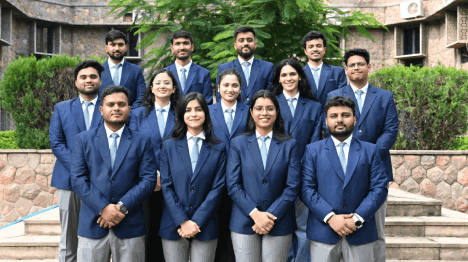- About Us
-
Academics
Schools
Programs
General Information
-
Faculty
The faculty members and researchers working at IIHMR University come from varied backgrounds including, but not limited to medicine, public health, management, economics, statistics, demography, human geography, social and behavioral sciences, rural development and pharmaceuticals.
-
Admissions
- Research
Publications & Journal
- Executive Education
Executive Programmes
- Online Certification Courses
ONLINE CERTIFICATION Courses
- Training
- Placements
- Contact
- Pradanya
- Blog
- Fee Payment
- NAAC
- IQAC
- NIRF
-
About Us
- About IIHMR University
- Board of Management
- Academic Council
- Board of Studies
- Research Board
- Institutional Review Board
- Finance & Audit Committee
- Departmental Research Committee
- Chairperson's Message
- President's Message
- IIHMR University Act
- Infrastructure
- Collaboration
- Ranking
- Board of Studies (School of Digital Health)
- Awards & Accolades
-
Academics
- Institute of Health Management Research
- School of Pharmaceutical Management
- ML Mehta School of Development Studies
- School of Digital Health
- SD Gupta School of Public Health
- MBA (Hospital and Health Management)
- MBA (Pharmaceutical Management)
- MBA (Development Management)
- MBA (Healthcare Analytics)
- Master of Public Health
- Student Manual – Cohort 9 (2021-2023)
- Master of Public Health (Offered by Johns Hopkins Bloomberg School of Public Health, USA in cooperation with IIHMR University, Jaipur, India)
- Ph. D.
- MBA CSR & ESG Management (Executive)
- MBA Sustainable Business Management (Executive)
- Common Information for all the Programs
- Academic Calendar
- Student Handbook 2020-21
- Committees
- Policies
- Annual Exam Calendar
- Library
- Faculty
- Officers of University
- Dean of Institute of Health Management Research
- Dean of School of Pharmaceutical Management
- Dean of School of Development Studies
- Dean of SD Gupta School of Public Health
- Dean of School of Digital Health
- School of Digital Health
- Faculty List A to Z
- Faculty List Designation Wise
- Faculty List School Wise
- Admissions
- Research
- Executive Education
- Training
- Placements
- Alumni
- Events
- Job Openings
- Contact
- Research
Pre and Post Assessment of Knowledge and Practice on WASH in Flood affected district of Malda in West Bengal
Agency : Save the Children, Bal Raksha, Bharat
The study on Pre and Post Assessment of Knowledge and Practices on WASH explored the knowledge, practice and awareness related to water, sanitation and hygiene in Habibpur and Bamongla- two flood affected blocks of Malda, West Bengal. The study explored the WASH behavior at household and institutional level, where at institutions level it covers schools and Anganwadi Centers. At household level study explored the WASH practice knowledge and accessibility for the women head in the households, adolescent girls and adolescent boys. For women and girls, it also examined the menstrual practice and knowledge.
The post assessment reported increase in usages of latrine with septic tank and decrease in usage of neighbors’ toilet for sanitation purposes, this implied that more households now have their own toilets. Situation of solid and liquid waste management represents a poor picture where the villages hardly have any drainage systems for disposing liquid waste. Solid wastes are disposed of mostly in household backyard and there is no system of community garbage pit or its collection or disposing off. Block administration expressed their willingness to develop community dumping ground in future, but it is yet to show its results. Both in pre and post assessment hand washing behavior showed uniform pattern. Hand washing with plain water is the most common practice whereas washing with water and soap can mostly be seen only post defecation, post cleaning child after he/she defecates and post cleaning menstrual waste. It is even absent before feeding the child or after handling raw food materials. Menstruation practice reported a mixed picture where most of the women are still using cloths. Girls prefer to stay out of school during their menstruation days following problem of changing the soaking materials at school. Both these group however report the poor quality of local made sanitary napkins.
Restriction in participation in religious function is the most common restriction both for women and girls. Regarding disposing the menstrual waste, they again have poor habit of putting it inside a pit or throwing it in a pond which is no more in use. Regarding food hygiene, although almost all of them are keeping the cooked food in a covered container, only one third of them are washing hand before touching the same.
At schools tube well remain the main source of drinking water and for AWC it is similar source used by the owner and it is submersible. In terms of knowledge, pre and post assessment did not see much change in knowledge level given the paucity of time. Diarrhea remains the most commonly reported disease due to unsafe water. They have fair knowledge on source of safe water but knowledge on water contamination was not clear. Though all of them heard about the vector borne diseases its linkages with poor solid and liquid waste management behavior is not clear to them. However, they do agree that diseases like dengue, chikungunya are now a day common in rural areas too. Knowledge on disease caused by open defecation and poor hand wash is again limited to diarrhea only. But how repeated suffering from the same can lead to chronic malnutrition for a child is not clear to the mother or adolescents. Their knowledge of illness caused by poor menstrual hygiene is near absent. Compared to respondents from household level, respondents from schools and AWCs have better knowledge. Regarding sources of knowledge on seven main issues including reproductive and child health the responses remain in between two television and health worker.



